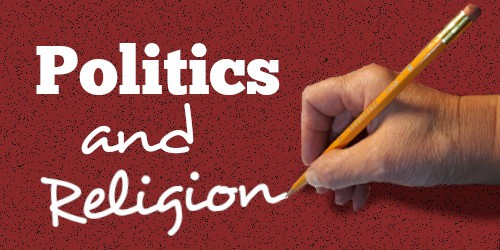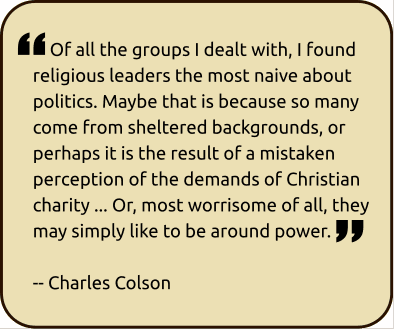Canadian Christians in the political systems: the positives, negatives, and the quest for a framework that the two parallel systems can work together.
There is no doubt that the Christian community’s contribution to society is enormous. Half-way houses, food distribution, addictions recovery, disaster assistance, child and family services, mental health and counseling assistance, AIDs respite, a moral and ethical voice, are a few of hundreds, perhaps a thousand more examples. If Christians and their institutions withdrew these services, Canadian society would suffer.
The service of Christian leaders in these areas naturally lead to expanding into the political realm. When making a move from religious to political servanthood, they are doing it from the goodness of their hearts. However, most are unaware of the pitfalls when entering the political realm.
Then there are those in the Renewalist realm (Pentecostal, Charismatic, and Third Wavers) who have a theological agenda to bring moral and religious change. They believe they are mandated by God to establish a universal sense of holiness and religious devotion within the greater Canadian community and throughout the world. They think this impetus will not only make a better present world but also prepare for the advent of the Messiah.
Some Christian leaders perceive that Canada is on the brink of moral bankruptcy. They consider political activism as a means to curb this excess.
The trickle-down Christian political philosophy
Most of these Christians hold to a trickle-down political ideology. They believe that to bring about positive moral change in Canada is to influence those in power, and these inherited values endorsed by the powerbrokers will trickle-down to every part of society.
To bring about this type of revision, these Christians believe leverage, clout, and people power are essential factors. They require a force that draws the attention of the vital public decision-makers, who then recognize the political necessity to change.
There is a general feeling within this camp that for this massive social shift to happen, it will only occur after the conversion of all the leaders to the Christian faith. This theory especially falls into those who embrace a doctrine called dominionism, found in the Charismatic movement. They believe that a massive international transformation to Christianity as a precursor to the end. Their active participation and leadership in civil matters is part of their mandate to bring this narrative to its apex.
If a maxim existed for such an approach, it would be, If you want God’s kingdom to have a strong influence on this land, learn to influence the key decision-makers in all.
This immediately poses several questions. Two especially come to mind: is this trickle-down concept moral or the best methodology that these followers can provide? And, are religious leaders adequately equipped to delve into the political realm?
Religious Canadian leaders have successfully entered the political realm. Influential voices in the past such as J.S. Woodsworth, Tommy Douglas, and William Aberhart have contributed with great success. Their experience has demonstrated lessons for others who follow. However, the dynamics today between religious and civic leaders are different. We are in a new era where those Evangelicals entering today must be fully aware of their roles, limitations, and pitfalls when engaging in the political process. Such integration can occur, but require mindful preparation or training in this realm. Political astuteness is necessary to provide the proper checks and balances.
Christian leaders must avoid political exploitation
Religious leaders can be manipulated because of their lack of experience with the political system. David Kuo, former second in command to President Bush’s office admits to milking the religious right for their allegiance. In a Time Magazine article, he quoted Chuck Colson, once aide to President Richard Nixon, saying, “I arranged special briefings in the Roosevelt Room for religious leaders, ushered wide-eyed denominational leaders into the Oval Office for private sessions with the President,” and then Colson adds, “Of all the groups I dealt with, I found religious leaders the most naive about politics. Maybe that is because so many come from sheltered backgrounds, or perhaps it is the result of a mistaken perception of the demands of Christian charity … Or, most worrisome of all, they may simply like to be around power.”1
The late Chuck Colson was an important aide to President Nixon, and later a born again Christian. He added that Christians must be engaged but with eyes open, aware of the snares and not be beholden to any political-ideological alignment.2
Power can corrupt and needs healthy checks and balances
Secondly, there is no such thing as altruism, and religious leaders are not exempt from this. One of the critical components of political involvement from a faith perspective is this following recognition. No matter how moral or pure our intentions are, the quest for power exists in every individual. No church leader, regardless of their reputation, can remain above this influence. It is a question of the degree and how much the religious leader’s peers and church community allows.
Martin Luther King, Jr. referred to this concept of power and one-upmanship as being motivated by the ‘Drum Major Instinct’, and that no-one, including himself, is outside its influence.3
People or organizations from a faith perspective need to acknowledge the drum-major instinct within their realm. The requirement of proper checks and balances to control is critical. This system avoids potential problems arising in the future. Correcting problems beforehand avoids embarassing defenses of the political activist and harm to the corporate religion.
Public fear of religious leaders imposing their agenda
Another important point Canadian religious leaders must be mindful of is public fear that religious advocates would force their agenda. Preston Manning opined this at McGill University’s “Pluralism, Religion, and Public Policy” conference held in 2002.
When advocates of faith-based positions convey the impression that they would force their positions on the rest of the population, if only they had sufficient power and influence to do so, is it any wonder that the rest of the population is reluctant to grant them standing and influence?
From a Canadian standpoint, this fear is very ubiquitous and is found both in our imaginative literature and in politics. For example, the well-known Canadian literary giant, Margaret Atwood, wrote a fictional novel, The Handmaiden, on what she thought could potentially happen if Protestant fundamentalists took over the government. An event that she perceived would have catastrophic repercussions on the role of women in society.
The public ideological alignment of Evangelicals and Renewalists with the Conservative Party of Canada could especially have long-term detrimental damage. Although this party may best represent many Christian principles, it is still a political party. Any massive political fallout with the public by way of hypocrisy, scandal, war or moral debate may cause a harsh public backlash against the Evangelical Church and foment publicly acceptable anti-Christian and church rhetoric.
Faith in the political realm
Christians should limit the use of religious language and especially the names of God in the political realm. On many occasions, one is only exerting an opinion shrouded in religious language. The issues may not reflect the opinions or character of God. By using the name or cloaking in religious language, it forces one into a corner. Whatever spoken becomes unchangeable, and there will be no way out. By not using religious language or God’s name, then one avoids potential consequences from the Lord Himself, whether now or in eternity, for misusing His authority. Limiting religious speech and converting it into public vernacular can also avoid public cynicism. One can exercise Christian conviction and not waver without having to resort to religious language or invoking the sacred names.
A healthy Christian political ideology: servanthood
A closer look at Jesus teachings on leadership indicate that the trickle-down theory was antithetical to a message to the majority of people whom He served. He did not come to persuade the powers-to-be. He came directly to the disenfranchised and gave them hope.
Traditional Evangelicals and Renewalists may posit that the power Christians possess for real change is evangelism. Social reform is dependant and can only happen through widespread personal repentance and submitting to God. Although evangelism has high importance, this is an incomplete answer that is over-simplistic.
Many belonging to the burgeoning Charismatic movement would argue the definition of power in supernatural terms; it is to destroy the works of Satan. This framework is not a consistent nor a comprehensive one.
Nor is it the Church’s purpose to represent, lead, and empower the oppressed and marginalized to overthrow tyrannical despots or corrupt leadership. This overthrow theory is also a top-down strategy that is ineffective.
St. Francis of Assissi provided part of the answer when he wrote: “where there is hatred, let me sow Your love.” His admonition goes nicely together with Christ’s words, “Whoever hits you on the cheek, offer him the other also; and whoever takes away your coat, do not withhold your shirt from him either.”
This servant approach may seem like such a cowardly withdrawal from any conflict that allows for exploitation or abuse, but rather, it is breaking the cycle of absolute power. They are encouraging people not to be controlled by conventions of worldly power. Instead, guided by a higher law of love and servanthood that is not subject to corruption, dishonesty, anger, bitterness or revenge.
Jesus described the heavenly definition of power as that of servanthood, “If you want to be great in God’s kingdom, learn to be the servant of all.” And also, “the Son of Man came not to be served, but to serve.” His definition of power ascribed almost the exact opposite of what we instinctually believe it to be.
The idea of leadership from a heavenly perspective is about the person who is most willing to do whatever it costs. They are motivated for the betterment of another being and respects everyone as equal partners. In many circles, this is called service. It is the opposite of pursuing power. Carl Jaspers, a humanist philosopher, concluded this when he wrote, “Where love rules, there is no will to power and where power predominates, there love is lacking. The one is the shadow of the other.”
There are many implications of holding onto such a philosophy, especially where faith and politics intertwine. First of all, it changes the role of the Christian. Instead of the Christian standing aloof and judging against the world, the primary purpose is helping others arrive at completeness in whatever area they lack, whether spiritual or physical.
It also avoids and corrects the idea that the church and Christians want to lord over others and force their opinions.
The mission of helping others then becomes the message. People such as Mother Teresa, St. Francis of Assisi, and lesser-knowns such as Dr. Paul Brandt, a specialist in leprosy, the late Winnipeg Pastor and activist, Harry Lehotsky, and more whose mission to serve has naturally also become the message. These names are all a positive part of the public conscience and transcend racial, socio-economic, cultural and religious barriers.
The church then becomes a center for serving those in need and constantly making adjustments as the needs arise. The halfways houses, food distribution, addictions recovery, disaster assistance, child and family services, and many other services are the churches calling card. As this increases in focus and even marketed, the church through service will become an active part of the Canadian mosaic rather than an outside bystander.■

